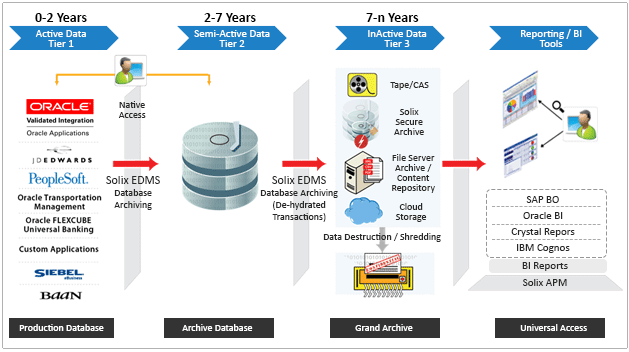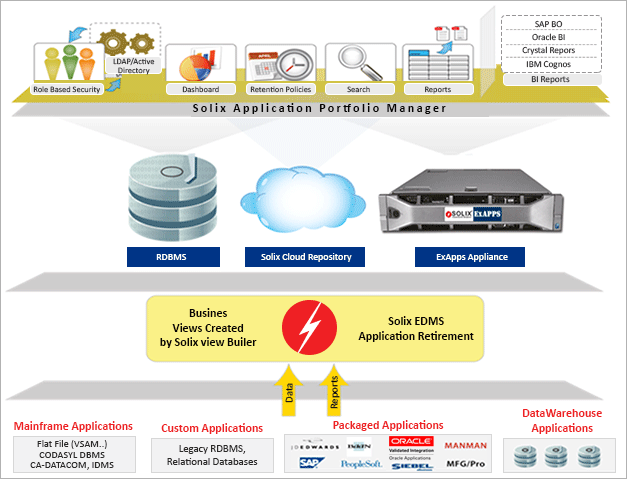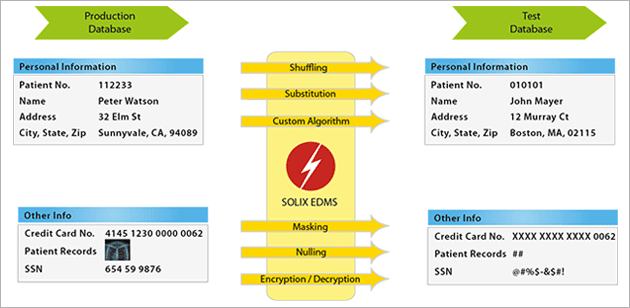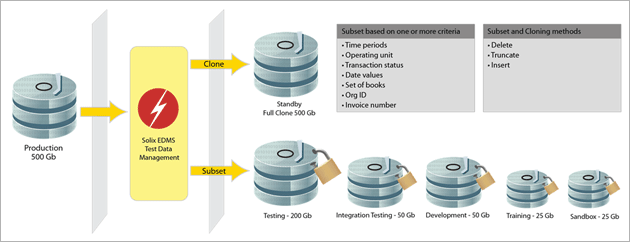
Enterprise applications are the back-bone of every business. These mission critical systems are responsible for processing and storing all the transactions and history of an organization. When application performance bottlenecks and availability concerns happen, the entire business is impacted. Data growth has been identified as a root cause to many if not most application performance and availability challenges. Over time transactions age and become inactive. Experts agree that as much as 80% of data in a typical production portfolio may be inactive, thus hindering application performance, causing outages and increasing IT costs. With each new transaction the inactive data grows putting more pressure on application performance and availability. Operations and compliance concerns arise as well as batch jobs, data replication and disaster recovery all run slower making online users wait longer. Extended outages must also be planned to convert legacy data to the new release during upgrade cycles. Solix EDMS Database Archiving moves less frequently accessed data out of production databases and into nearline archive based on an Information Lifecycle Management (ILM) framework. Data retention policies are employed to manage the archive process and users always maintain access to archived data. Data may be classified by business value, legal hold and regulatory requirement for compliance. The result is improved application performance and availability because production database sizes are reduced.


Experts believe as many as 40 percent of applications in a non-optimized portfolio are eligible for retirement, rationalization or migration. These outdated applications consume computing resources, storage, and manpower, yet provide little business benefit. Solix EDMS Application Retirement decommissions legacy applications while maintaining access to critical application data. Return on investment (ROI) is nearly immediate as legacy system support charges are either greatly reduced or eliminated entirely. All data is not equal. As data ages it is accessed less and less frequently. Many legacy systems are maintained online for occasional access only despite straining IT resources. It is the job of Information Management Lifecycle to manage application decommissioning and retirement through a framework of governance, risk and compliance policies for data retention. Solix EDMS Application Retirement offers a viable strategy for application portfolio rationalization, data center consolidation, decommissioning of legacy applications, improving operational efficiency, reducing data costs and meeting compliance goals. Access to critical retired data is maintained through Solix Application Portfolio Manager and BI reporting tool.
Many organizations use production data to populate their test environments, non-production data is a key target for attackers seeking access to sensitive information. Non-production and test data volumes may also be many times greater than production, thus enlarging the vulnerable attack surface further. Sensitive test data is exposed not only to outside attackers, but to insider threats since they are mostly stored unencrypted. Solix EDMS Data Masking is perfect for training, testing, development and offshore environments. Because it de-identifies or scrambles sensitive data with fictionalized, but syntactically correct substitute data, developers and testers maintain necessary realism and sensitive data is properly secured.


Accurate test data improves application development quality. As a result it is not unusual for a Test Data Management (TDM) program to maintain six to eight full clones of the production database for use as test and development instances. Without proper automation the task to create, configure and maintain so many clones is an inefficient and labor-intensive activity. Sensitive data must first be discovered, classified and then masked to meet compliance goals. Storage requirements may increase up to eight fold to accommodate the volume of test data. Since the cloning process creates such resource drain and data governance challenges, test and development databases are often not refreshed frequently enough. As data becomes stale the risk grows that subsequent development changes will produce inaccurate test results or even test failure. And of course, the cost of application development errors increases as the errors are discovered later and later in the application development lifecycle. Solix EDMS Test Data Management creates intelligently sized database subsets not clones to reduce test data storage requirements by up to 80 percent. Database subsets are smaller to save storage space, but still provide a syntactically correct copy of the production database to achieve the most accurate test results. When combined with Solix EDMS Data Masking, sensitive test data may be classified and then properly masked to ensure compliance and to protect against data breach.
A central challenge for enterprise data warehouse (EDW) platforms is to deliver highly specific data views that meet the needs of business users rather than canonical top-down enterprise views which may or may not satisfy end user’s requirements. The Solix Data Lake reduces the complexity and processing burden to stage EDW and analytics applications, and it provides highly efficient, bulk storage of enterprise data for later use when it is needed.
The Solix Data Lake provides a copy of production data and stores it “as is” in bulk to be better described and distilled later. This simple COPY process eliminates the need for heavy extract transform load (ETL) processing during ingestion. Once resident within the Hadoop file system (HDFS), enterprise data may better described or transformed later for use with business analytics applications such as those available from the Solix App Store. The Solix Data Lake employs an Information Lifecycle Management (ILM) framework to meet governance, risk and compliance objectives and ensure that best practices for data retention and classification are deployed. ILM policies and business rules may be pre-configured to meet industry standard compliance objectives such as COBIT or custom designed to meet more specific requirements.

Solix Enterprise Archiving and Solix Data Lake applications utilize best practice ILM processes to ingest and store both structured and unstructured enterprise data. Data retention is based on policies and business rules to ensure proper compliance and control. Universal data access is maintained through structured reporting as well full text search.